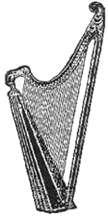|
Agitation promises to do
something for this national instrument. The journals of the Principality
have taken up the matter warmly. So also, have some of the influential
Welsh families; and, lastly, the Eisteddfod Council is stirring with a
considerable show of zeal. One result, so far, has been the appointment of
Lady Llanover's blind harper, Thomas Gryffydd [sic], to be harper
extraordinary to the Prince of Wales; and another is the issue by Mr.
Mostyn Williams, the new and energetic secretary to the Eisteddfod, of the
following circular, which we hope, in the interest of a curious and
valuable national relic, will find a hearty response:-
|

|
|
"The secretary of
the Eisteddfod begs respectfully to call the attention of his countrymen to
the following letter from the eminent musical composer, Mr. Brinley
Richards, and to an article which lately appeared in the 'Carnarvon and
Denbigh Herald.' The object of preserving our national instrument, and
restoring, if possible, its ancient prestige, must commend itself to the
favourable consideration of every true patriot. Emanating from a source
where no selfish motives can exist, and pleaded with so much earnestness,
from faith in the intrinsic merits of the instrument itself, independent of
its historical associations, the case needs no further advocacy. As a
matter of fact, it must be admitted, that the old triple harp is fast
falling into desuetude. A few specimens may be found here and there, more
as objects of curiosity, and relics of bygone days, than instruments to be
played upon in this mechanical and utilitarian age. Two means have been
suggested for the restoration of the 'harp of Wales.' The assistance of our
aristocracy and gentry, on the one hand, and the co-operation of the
national Eisteddfod on the other. The Welsh nation is greatly indebted to
Lady Llanover for what she has done to preserve and promote its music and
literature. The soul-stirring sounds of a Welsh harp re-echo through her
ancestral hall, awakened by a most skilful minstrel. At Bodelwyddan Hall,
the seat of Sir H. Williams, the same ancient custom prevails, and in other
private families the playing of our national instrument is cultivated as an
accomplishment. It is to be hoped the appeal now made, originating as it
now does in the genuine patriotism of one who thoroughly understands the
subject, and supported as it has been by gentlemen of taste and learning,
as well as by the newspaper press throughout the country, will meet with
the response it deserves from all classes alike, and that our neglected
instrument will become once more familiar. The secretary, on behalf of the
Eisteddfod Council, has great pleasure in stating that the Welsh harp will
form an important feature in their future arrangements. In addition to Mr.
Brinley Richards's offer for the Brecon Eisteddfod of 1870, which is to be
under his musical direction, they intend to invite competition in the
manufacture of triple-stringed harps, which shall combine elegance of
design, beauty of adornment, sweetness of tone, and economy. They will also
endeavour to establish a department for the qualification of teachers, and
do all in their power to restore the harp to its ancient position. The
co-operation of everyone who feels an interest in the subject is invited,
and any suggestion of a practical character will be thankfully
received."
|
